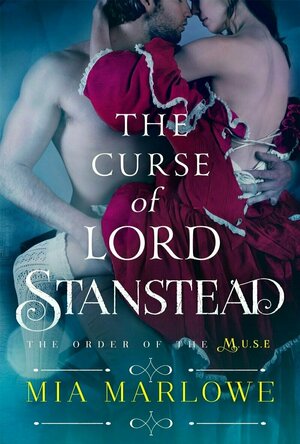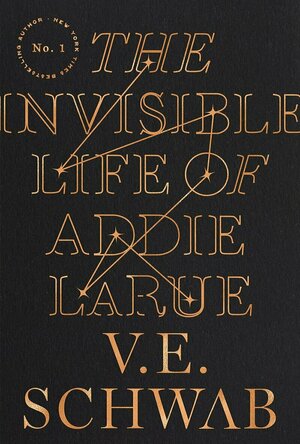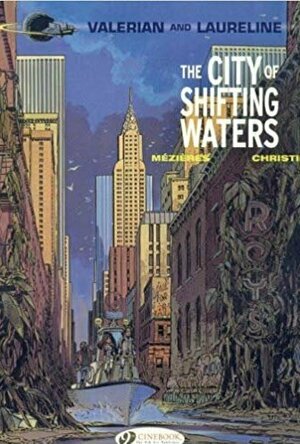Search
Search results

Summer of '69
Book
Follow New York Times bestselling author Elin Hilderbrand back in time and join a Nantucket family...
Merissa (13737 KP) rated The Curse of Lord Stanstead (The Order of the MUSE #1) in Books
Apr 14, 2023
This is one of Entangled's Select Historical novels and my first introduction to both them and this author. I have to say that I am in no way disappointed!
The Order of the M.U.S.E. is a secret society that you learn about as you go on. They have various members who are capable in various ways. The latest 'recruit' is Cassie, an emergent fire mage who needs help controlling her element. But this is also during the time of the 'mad King George' and it is the Order's job to protect royalty against any who would harm them. Where there is yin, there is yang and although it is only mentioned in passing, you are left with the impression that there is another Order there who seeks to harm, not help.
This is very well written and gives you a good insight on the ton and the rules and regulations that would need to be followed to be part of Polite Society. The plot is smoothly written and moves along at a fair pace, never slumping.
A warm-hearted story with a hint of mystery, a dash of the paranormal and more than a tinge of hot romance. Definitely recommended.
* A copy of this book was provided to me with no requirements for a review. I voluntarily read this book; the comments here are my honest opinion. *
Merissa
Archaeolibrarian - I Dig Good Books!
Jul 28, 2015
The Order of the M.U.S.E. is a secret society that you learn about as you go on. They have various members who are capable in various ways. The latest 'recruit' is Cassie, an emergent fire mage who needs help controlling her element. But this is also during the time of the 'mad King George' and it is the Order's job to protect royalty against any who would harm them. Where there is yin, there is yang and although it is only mentioned in passing, you are left with the impression that there is another Order there who seeks to harm, not help.
This is very well written and gives you a good insight on the ton and the rules and regulations that would need to be followed to be part of Polite Society. The plot is smoothly written and moves along at a fair pace, never slumping.
A warm-hearted story with a hint of mystery, a dash of the paranormal and more than a tinge of hot romance. Definitely recommended.
* A copy of this book was provided to me with no requirements for a review. I voluntarily read this book; the comments here are my honest opinion. *
Merissa
Archaeolibrarian - I Dig Good Books!
Jul 28, 2015
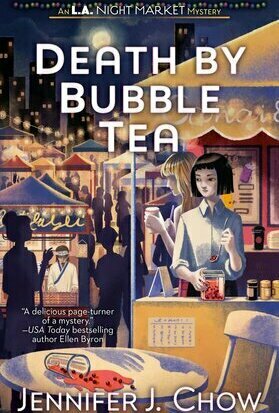
Death by Bubble Tea
Book
Two cousins who start a food stall at their local night market get a serving of murder in this first...
ClareR (6062 KP) rated The Invisible Life of Addie LaRue in Books
May 29, 2023
Addie doesn’t want to marry and become just a wife and mother, waiting for old age and death. She wants to really live! So, on her wedding day she runs to the forest and asks the spirits there for help, just as her friend, and elderly woman, does. Addie has been warned not to make deals with the dark, but her plea for help coincides with dusk, and the wrong god/ spirit comes to her help. The deal is struck, and Addie finds herself making a deal that means for the cost of her soul, she will live for as long as she wants. It’s only afterwards that she learns that one of the conditions is that no one will remember her.
Until the day she meets Henry in present day New York.
Honestly, I don’t know why she had such a problem with the god she struck the deal with. He’s clearly rather dishy - dark, brooding, very powerful…
I’ve seen this described as Faustian, and I suppose it is. She makes a deal with a devil to live for longer. Except her deal has no time limit, or at least only the limit that she’ll give it.
I thoroughly enjoyed this. The Henry character was interesting as well, especially after his reveal.
This author has written a lot of YA apparently, and this is her first adult novel. It’s definitely worth keeping my eyes peeled for whatever she comes up with next!
Until the day she meets Henry in present day New York.
Honestly, I don’t know why she had such a problem with the god she struck the deal with. He’s clearly rather dishy - dark, brooding, very powerful…
I’ve seen this described as Faustian, and I suppose it is. She makes a deal with a devil to live for longer. Except her deal has no time limit, or at least only the limit that she’ll give it.
I thoroughly enjoyed this. The Henry character was interesting as well, especially after his reveal.
This author has written a lot of YA apparently, and this is her first adult novel. It’s definitely worth keeping my eyes peeled for whatever she comes up with next!
Debbiereadsbook (1647 KP) rated Take The Shot (Philadelphia Bulldogs #1) in Books
Jun 9, 2020
really good read x
Independent reviewer for Archaeolibrarian, I was gifted my copy of this book.
Sometimes, you just need a book that you just fall into, losing all around you, and reading about 2 people falling in love. And this is such a book.
Dinah lost her husband 2 years ago. Moving on seemed like a good idea, and a bad one, all at the same time. Her neighbour provides some eye candy, but he is so much younger than she is and she doesn't think he would want anything other than friendship. Noah lives in the next door apartment. Noah has lusted over Dinah for ages, but she was married, then widowed. He wasn't gonna make a move til she was ready. If she never did, he would be heartbroken, but he would rather have Dinah as a friend, than not at all.
This is a delightful read! I'm not the greatest fan of first person books, I make no secret of that, but I really rather loved this one!
Noah, bless him, 22 years old, lusts after Dinah, has done since he met her. But he kept it to himself, she was married. And after he died, he found himself helping her in more ways than he ever expected. But he waited, he WAS waiting for Dinah. Waiting for her to let him know she was ready to move on. He would wait, however long it took. Til his housemates gave him an ultimatum: Ask her out, or one of them would. They could see what Noah could not, that Dinah was lusting after Noah as much as Noah lusted after her. They just had to act on it.
And it is wonderful when they do! Yes, the attraction is powerful and hot, but there is much emotion here, not just steamy sex. There is much between these two, BEFORE they get to the bedroom, which would be spoilers to explain. And I really found those bits far better than the sexy bits, but thats not to say the sexy bits aren't good :-p
There is a supporting cast who have their own problems, and I hope they all get their story in this series.
The hockey bits, I will admit, I tended to flip over, but then something happened in one and I had to go back, so, yeah, I actually read the hockey bits after that!
There are a couple of lines that are repeated, more times than was really necessary. BUT! I've seen that this is the author's first book, so I'm not really complaining, I'm just saying!
A thoroughly enjoyable read, so for a first time author? Well done, Ms Flynn, very well done.
4 good solid stars
**same worded revivew will appear elsewhere**
Sometimes, you just need a book that you just fall into, losing all around you, and reading about 2 people falling in love. And this is such a book.
Dinah lost her husband 2 years ago. Moving on seemed like a good idea, and a bad one, all at the same time. Her neighbour provides some eye candy, but he is so much younger than she is and she doesn't think he would want anything other than friendship. Noah lives in the next door apartment. Noah has lusted over Dinah for ages, but she was married, then widowed. He wasn't gonna make a move til she was ready. If she never did, he would be heartbroken, but he would rather have Dinah as a friend, than not at all.
This is a delightful read! I'm not the greatest fan of first person books, I make no secret of that, but I really rather loved this one!
Noah, bless him, 22 years old, lusts after Dinah, has done since he met her. But he kept it to himself, she was married. And after he died, he found himself helping her in more ways than he ever expected. But he waited, he WAS waiting for Dinah. Waiting for her to let him know she was ready to move on. He would wait, however long it took. Til his housemates gave him an ultimatum: Ask her out, or one of them would. They could see what Noah could not, that Dinah was lusting after Noah as much as Noah lusted after her. They just had to act on it.
And it is wonderful when they do! Yes, the attraction is powerful and hot, but there is much emotion here, not just steamy sex. There is much between these two, BEFORE they get to the bedroom, which would be spoilers to explain. And I really found those bits far better than the sexy bits, but thats not to say the sexy bits aren't good :-p
There is a supporting cast who have their own problems, and I hope they all get their story in this series.
The hockey bits, I will admit, I tended to flip over, but then something happened in one and I had to go back, so, yeah, I actually read the hockey bits after that!
There are a couple of lines that are repeated, more times than was really necessary. BUT! I've seen that this is the author's first book, so I'm not really complaining, I'm just saying!
A thoroughly enjoyable read, so for a first time author? Well done, Ms Flynn, very well done.
4 good solid stars
**same worded revivew will appear elsewhere**
EmersonRose (320 KP) rated The City of Shifting Waters (Valérian and Laureline, #1) in Books
Nov 20, 2019
On July 21, 2017, Valerian and the City of a Thousand Planets came out in theaters the U.S. After watching the movie I found myself intrigued by the characters, world, and the passion shown by the director and writer Luc Besson showed for the project. I took this interest and decided to start reading the comic books. Thus far I have been able to read three of the volumes, as they are French comics they are not usually kept in stores and I have to order them.
The Valerian and Laureline comics follow Valerian, a handsome and cocky time and space traveler, and Laureline, his stubborn and beautiful partner. They travel together across space and time on missions for Galaxity, the capital of the Terran Empire in the 28th century. They explore strange worlds with fascinating creatures, deal with complicated political situations, and take the reader through rewritten history.
I immediately fell in love with the comics for the same reasons I enjoyed the film. The first is that the world that author Pierre Christin and artist Jean-Claude Mezieres created is truly fantastical. It falls under the same sci-fi mixed with fantasy genre that Star Wars is under. The great space galaxy is full of planets that are home to a wide range of alien species, each with complicated politics, cultures, and aesthetics.
The second reason is that I love the relationship between Valerian and Laureline. I am a very character driven person in both my reading and writing so I am a sucker for a good relationship, romantic, familial, or friendship. Valerian and Laureline start the first comic playing chess. Valerian is cocky and does not like to lose, but he is kind and smart and works hard to make the world a better place. Laureline is funny, stubborn, and unlike Valerian, she does not feel the same sense of loyalty to the Terran Empire and therefore is okay with bending the rules to save the most people. They make for a great team, and their fun banter adds to the overall charm of the story.
7810429The first issue of the series was released in 1967 and ran till 2010. Initially, all were written in French but has since been translated into English and several other languages. This series plays with a lot of the sci-fi/fantasy tropes that make you fall in love with stories in the genre, and has even been compared to Star Wars as the basis for several of the ideas used in the Star Wars films, such as the look of some of the characters and situations characters find themselves in.
This is a fun and exciting comic series that got me into reading101694 comics in the first places. I will certainly be continuing my reading of these books so that I can continue being apart of the Valerian and Laureline story. I also enjoyed the film and hope that the passion the Luc Besson showed will be enough to allow him to make another film in the series.
I would highly recommend this series!
The Valerian and Laureline comics follow Valerian, a handsome and cocky time and space traveler, and Laureline, his stubborn and beautiful partner. They travel together across space and time on missions for Galaxity, the capital of the Terran Empire in the 28th century. They explore strange worlds with fascinating creatures, deal with complicated political situations, and take the reader through rewritten history.
I immediately fell in love with the comics for the same reasons I enjoyed the film. The first is that the world that author Pierre Christin and artist Jean-Claude Mezieres created is truly fantastical. It falls under the same sci-fi mixed with fantasy genre that Star Wars is under. The great space galaxy is full of planets that are home to a wide range of alien species, each with complicated politics, cultures, and aesthetics.
The second reason is that I love the relationship between Valerian and Laureline. I am a very character driven person in both my reading and writing so I am a sucker for a good relationship, romantic, familial, or friendship. Valerian and Laureline start the first comic playing chess. Valerian is cocky and does not like to lose, but he is kind and smart and works hard to make the world a better place. Laureline is funny, stubborn, and unlike Valerian, she does not feel the same sense of loyalty to the Terran Empire and therefore is okay with bending the rules to save the most people. They make for a great team, and their fun banter adds to the overall charm of the story.
7810429The first issue of the series was released in 1967 and ran till 2010. Initially, all were written in French but has since been translated into English and several other languages. This series plays with a lot of the sci-fi/fantasy tropes that make you fall in love with stories in the genre, and has even been compared to Star Wars as the basis for several of the ideas used in the Star Wars films, such as the look of some of the characters and situations characters find themselves in.
This is a fun and exciting comic series that got me into reading101694 comics in the first places. I will certainly be continuing my reading of these books so that I can continue being apart of the Valerian and Laureline story. I also enjoyed the film and hope that the passion the Luc Besson showed will be enough to allow him to make another film in the series.
I would highly recommend this series!
graveyardgremlin (7194 KP) rated Midsummer Magic (Magic Trilogy, #1) in Books
Feb 15, 2019
After a fairly good start (about the first 80 pages or so), I was hooked and was enjoying the book, then it went downhill and I finally stopped on page 218. Be warned, there is what could be considered (in our times at least) rape. However, it was a husband's duty to get his wife with heir; and I do get it, but that doesn't mean I want to read about it in a romance...repeatedly. I believe I could have gotten over the first 'rape,' but then it happened again, and again, and most likely again but I stopped before what might have been. Enough already!
I ended up hating both the so-called heroine and hero, they just were not sympathetic, interesting, or anything other than horrible. Frances started fights, cowers, and snivels all the time, and frankly, she should have known she needed to fulfill her "wifely duty" to get with heir. Now I am not in any way saying rape is right, but back then she should have known what was going to happen, and all she does is act belligerent and righteous about it and wants to be left alone (Ha!). Then there's Hawk (ugh!), who is detestable, shows no remorse, and the author actually writes about him with his mistress! What is Ms. Coulter smoking? I can't even fathom them going from hate to love (and I do mean hate!), which apparently doesn't happen according to other Amazon reviewers.
The author says the book "is just dandy the way it is," but it totally is not. She goes on to say that we'll chuckle and may even howl with laughter because of the battle of the sexes.... Now I don't know about that because I couldn't get past how totally unlikable Hawk and Frances were, among the other things mentioned, so who knows? And frankly, I don't care to know. This book needed many rewrites and I do not recommend it at all! I wish I listened to the reviews and stayed away, but no, I had to stick with it. What can I say, I'm stubborn. To be honest I thought there was only one rape scene in the book and didn't know there were more, but I usually only skim them so I don't read any spoilers. I am so sorry I read so much of this when I could have been enjoying a much better book. I really don't think I'll ever pick up another book from Ms. Coulter if her other books are like this.
I ended up hating both the so-called heroine and hero, they just were not sympathetic, interesting, or anything other than horrible. Frances started fights, cowers, and snivels all the time, and frankly, she should have known she needed to fulfill her "wifely duty" to get with heir. Now I am not in any way saying rape is right, but back then she should have known what was going to happen, and all she does is act belligerent and righteous about it and wants to be left alone (Ha!). Then there's Hawk (ugh!), who is detestable, shows no remorse, and the author actually writes about him with his mistress! What is Ms. Coulter smoking? I can't even fathom them going from hate to love (and I do mean hate!), which apparently doesn't happen according to other Amazon reviewers.
The author says the book "is just dandy the way it is," but it totally is not. She goes on to say that we'll chuckle and may even howl with laughter because of the battle of the sexes.... Now I don't know about that because I couldn't get past how totally unlikable Hawk and Frances were, among the other things mentioned, so who knows? And frankly, I don't care to know. This book needed many rewrites and I do not recommend it at all! I wish I listened to the reviews and stayed away, but no, I had to stick with it. What can I say, I'm stubborn. To be honest I thought there was only one rape scene in the book and didn't know there were more, but I usually only skim them so I don't read any spoilers. I am so sorry I read so much of this when I could have been enjoying a much better book. I really don't think I'll ever pick up another book from Ms. Coulter if her other books are like this.
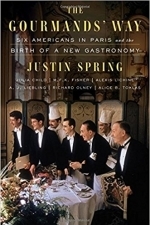
The Gourmands’ Way: Six Americans in Paris and the Birth of a New Gastronomy
Book
“In The Gourmands’ Way, Justin Spring brilliantly recounts the French odyssey of six remarkable...
Biography food
MaryAnn (14 KP) rated A Promise Forged (Ohio Brides #3) in Books
Mar 5, 2019
Kat transformed in front of him. Her chin came up, her fingers stopped twitching with the fabric of her gown, and a real sparkle bubbled in her eyes. It was like watching Snow White come to life when the prince kissed her. A heartwarming WWII historical from award-winning author Cara Putman: Kat Miller has dreamed of playing baseball her entire life. When she earns a spot on a team in the All-American Girls Professional Softball League, she finds that things aren’t as glamorous as she imagined. She struggles with long road trips, grueling practices, and older teammates who are jealous of her success. And to top it all off, an irritating reporter is constantly getting under Kat’s skin. Events in Jack Raymond’s career have left him cynical and distanced from God. He never wanted to write at a small paper, and he certainly didn’t want to be assigned to something as inconsequential as a women’s softball team. Then Kat walks into his life. The fiery, young softball player somehow climbs the walls around his heart and makes him want to hope again. When lies fly and the league appears to fail, will Kat and Jack’s new love survive?
My Thoughts: Every girl has a dream, and this time it's Kat's turn to have hers come true! A chance to play professional baseball. Cara Putman has weaved history and fiction in an entertaining storyline; s based the all women's league that was formed during the second world war.
Kat is the youngest member on the team and as I read the book, I wanted to take her under my wing and protect her from her jealous teammates. Kat had to suffer being away from her family, the jealousy of some of her teammates, traveling, grueling schedules and falling in love for the first time.
This was a very entertaining novel. I truly enjoyed it and it was a pleasure to read. One of the things I enjoyed about the book, was that Kat wanted to make a difference. She wanted to be a light for the Lord where ever she went. Her actions actually made Jack turn back to the Lord.
Even though I hadn't read the first two books, this was easy to follow on its own. I would love to read more from Cara Putman.
My Thoughts: Every girl has a dream, and this time it's Kat's turn to have hers come true! A chance to play professional baseball. Cara Putman has weaved history and fiction in an entertaining storyline; s based the all women's league that was formed during the second world war.
Kat is the youngest member on the team and as I read the book, I wanted to take her under my wing and protect her from her jealous teammates. Kat had to suffer being away from her family, the jealousy of some of her teammates, traveling, grueling schedules and falling in love for the first time.
This was a very entertaining novel. I truly enjoyed it and it was a pleasure to read. One of the things I enjoyed about the book, was that Kat wanted to make a difference. She wanted to be a light for the Lord where ever she went. Her actions actually made Jack turn back to the Lord.
Even though I hadn't read the first two books, this was easy to follow on its own. I would love to read more from Cara Putman.
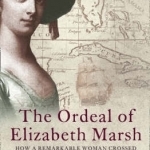
The Ordeal of Elizabeth Marsh: How a Remarkable Woman Crossed Seas and Empires to Become Part of World History
Book
From the author of 'Britons', the story of the exceptional life of the intrepid Elizabeth Marsh - an...
